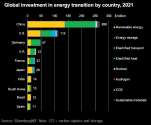You fell into the trap of believing that soft "power" actually matters materially for China at this stage.
What matters now is hard power. And since hard power is a zero-sum game, we got to wait until China beats US or become extremely strong to withstand Western pressure, before soft power really starts working.
In any case, soft power propaganda cannot fool a country's elites when the hard power is not strong enough
No, both is important. Countless examples where China's growth and development was setback or impeded because their lack of soft power in certain areas that let the US sell a convincing China = bad narrative. Lets see here:
BRI projects put on hold or scaled back due to China not being able to counter the "debt trap" narrative.
Huawei and ZTE"s international expansion plans and growth in new markets made harder due to "spying" claims that China couldn't effectively counter.
Strikes and riots in Chinese owned mines in Africa due to false narratives that Chinese owners are exploiting and abusing workers.
Uyghur genocide and slave labor accusations leading to various Xinjiang industries being set back due to product bans impacting global sales of Chinese and international companies using Xinjiang cotton.
Softpower is efficient and effective because we're seeing it effectively being used against China in just those above examples alone. Each of those have a material yuan cost against China or Chinese companies.

